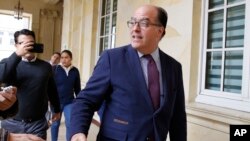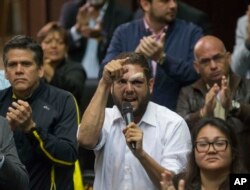Venezuela's pro-government constitutional assembly stripped two opposition lawmakers of their immunity from prosecution Wednesday, accusing them of having roles in a drone attack that authorities say was an attempt to kill socialist President Nicolas Maduro.
The National Constituent Assembly voted unanimously to lift the protection for Julio Borges and Juan Requesens, who have seats in the opposition-controlled legislature. The move came after the Supreme Court ordered the arrest of Borges, who lives in in exile in Colombia's capital, Bogota. Requesens was arrested Tuesday.
Maduro has accused the two of being tied to a weekend incident in which two drones exploded while he spoke at an outdoor military celebration.
Wednesday's developments threaten to deepen Venezuela's political crisis as opposition lawmakers accuse the government's ruling party of using the alleged attack to clamp down on the opposition.
Constituent Assembly leader Diosdado Cabello said Borges and Requesens were just the first lawmakers to be accused in the investigation of the incident.
"These are the first two who appear to be involved, but the investigation continues,'' Cabello said. "Justice is coming.''
'Flagrant crimes'
In ordering the arrest of Borges, 48, the Supreme Court accused him of "flagrant crimes,'' including public incitement, treason and attempted homicide.
During a national television broadcast on Tuesday, Maduro accused Requesens, 29, and Borges of complicity in the weekend drone explosions.
Maduro said statements from some of the six suspects arrested earlier had implicated the two lawmakers, as well as key financiers.
"Several of the declarations indicated Julio Borges. The investigations point to him,'' Maduro said, though he provided no details of Borges' alleged role.
On Wednesday, Borges, who has rejected the accusation, met with top lawmakers in Colombia, which has blamed Maduro's government for causing the crisis that has led to masses of Venezuelans fleeing across the border into the neighboring country.
"We want to see you out of power, imprisoned for the violation of human rights, imprisoned for the destruction of democracy,'' Borges said. "The only promoter of violence is a man named Nicolas Maduro.''
Antonio Ledezma, an opposition leader and exiled mayor of Caracas who now lives in Spain, stood alongside Borges in Bogota.
"Neither the deputy Borges, nor the deputy Requesens — no Venezuelan parliamentarians are involved in this type of scheme cooked up by the regime,'' Ledezma said. "This is another parody of Maduro.''
The six suspects arrested earlier face charges of treason, attempted murder and terrorism. Investigators have linked a total of 19 people to the attack, Chief Prosecutor Tarek William Saab said Wednesday.
Critics of Maduro's socialist government said immediately after the drone explosions that they feared the unpopular leader would use the incident as an excuse to round up opponents as he seeks to dampen spreading discontent over Venezuela's devastating economic collapse.
Economic slide
The events came as Venezuela's economy continues to hemorrhage and thousands flee to neighboring nations seeking food and medical care. Maduro has grown increasingly isolated, with the United States and other foreign powers slapping economic sanctions on a growing list of high-ranking Venezuelan officials and criticizing his government for being an autocratic regime.
The International Monetary Fund projects inflation could top 1 million percent by year's end.
During Maduro's two-hour speech, videos were displayed showing alleged suspects and images of the drones exploding. One video included a purported confession by a handcuffed suspect, whose face was blurred out.
The president also displayed wanted posters with names and pictures of other suspects who he said are living in the United States and Colombia.
Maduro said he would provide evidence to authorities in both countries and ask for their cooperation in handing over suspects who helped orchestrate and finance the attack.
"I want to explain to the government of the United States and the government of Colombia in detail all the evidence,'' Maduro said. "I trust in the good faith of Donald Trump.''
Venezuela's foreign minister, Jorge Arreaza, and Saab, the attorney general, met Wednesday with James Story, the top U.S. diplomat in Caracas.
The U.S. State Department declined to comment on what was discussed or whether Venezuela had made any extradition request.





